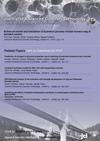Error Factors in Quantifying Inorganic Carbonate CO<sub>2</sub> in Concrete Materials
IF 2
4区 工程技术
Q3 CONSTRUCTION & BUILDING TECHNOLOGY
引用次数: 0
Abstract
In this study, CO2 quantification was performed on various concrete binder and aggregates by back titration, ther-mogravimetric method, and combustion-infrared absorption method, and their mutual consistency and error factors due to material characteristics were investigated. The back titration measures CO2 directly and is considered the suitable method for both materials, although the effect of sulfide was a concern. On the other hand, the TGA method was revealed to have the possibility of underestimating or overestimating the CO2 determination because the oxidation of sulfides in blast furnace slag, combustion of unburned carbon in fly ash, and dehydration of clay minerals in aggregate overlapping with the temperature range of calcination of calcium carbonate. In the combustion-infrared absorption method, elemental or organic carbon encapsulated in aggregate particles may underestimate or overestimate the CO2 content. In blended cement, sulfur compounds may interfere with the infrared absorption of CO2 and overestimate the amount of CO2. Based on these results, back titration was considered the most suitable method for determining CO2 for concrete materials. It is essential to understand the characteristics of each sample contained and select appropriate methods for CO2 quantification of concrete materials and concrete.无机碳酸盐CO<sub>2</sub>在混凝土材料中
本研究通过反滴定法、热重法和燃烧-红外吸收法对各种混凝土粘结剂和骨料进行了CO2定量,并考察了它们之间的相互一致性和由于材料特性造成的误差因素。反滴定法直接测量二氧化碳,被认为是适用于这两种材料的方法,尽管硫化物的影响是一个问题。另一方面,由于高炉炉渣中硫化物的氧化、粉煤灰中未燃碳的燃烧、骨料中粘土矿物的脱水与碳酸钙煅烧温度范围重叠,揭示了TGA法存在低估或高估CO2测定值的可能性。在燃烧-红外吸收法中,包裹在团聚颗粒中的元素碳或有机碳可能会低估或高估CO2含量。在混合水泥中,含硫化合物可能会干扰CO2的红外吸收,使CO2的量被高估。基于这些结果,反滴定法被认为是测定混凝土材料CO2最合适的方法。必须了解所含样品的特性,并选择合适的方法对混凝土材料和混凝土进行CO2量化。
本文章由计算机程序翻译,如有差异,请以英文原文为准。
求助全文
约1分钟内获得全文
求助全文
来源期刊

Journal of Advanced Concrete Technology
工程技术-材料科学:综合
CiteScore
3.70
自引率
10.00%
发文量
45
审稿时长
3.5 months
期刊介绍:
JACT is fast. Only 5 to 7 months from submission to publishing thanks to electronic file exchange between you, the reviewers and the editors.
JACT is high quality. Peer-reviewed by internationally renowned experts who return review comments to ensure the highest possible quality.
JACT is transparent. The status of your manuscript from submission to publishing can be viewed on our website, greatly reducing the frustration of being kept in the dark, possibly for over a year in the case of some journals.
JACT is cost-effective. Submission and subscription are free of charge . Full-text PDF files are available for the authors to open at their web sites.
Scope:
*Materials:
-Material properties
-Fresh concrete
-Hardened concrete
-High performance concrete
-Development of new materials
-Fiber reinforcement
*Maintenance and Rehabilitation:
-Durability and repair
-Strengthening/Rehabilitation
-LCC for concrete structures
-Environmant conscious materials
*Structures:
-Design and construction of RC and PC Structures
-Seismic design
-Safety against environmental disasters
-Failure mechanism and non-linear analysis/modeling
-Composite and mixed structures
*Other:
-Monitoring
-Aesthetics of concrete structures
-Other concrete related topics
 求助内容:
求助内容: 应助结果提醒方式:
应助结果提醒方式:


